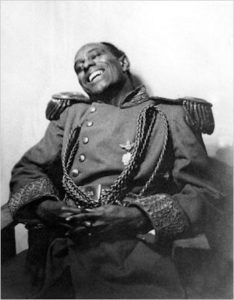
Charles Gilpin
Charles Gilpin was born on this date in 1878. He was a Black actor and singer.
Born in Richmond, VA, Charles Sidney Gilpin first came on stage as a singer at 12. In 1896, he joined a minstrel show, leaving Richmond and beginning a life on the road for many years. When not on stage in theaters, restaurants, and fairs, he worked odd jobs as a printer, barber, boxing trainer, and railroad porter. He worked as an apprentice in the Richmond Planet print shop.
In 1903, Gilpin joined Hamilton, Ontario’s Canadian Jubilee Singers. He soon began finding his career in theater and became one of the most highly regarded actors of the 1920s.
Two years later, he performed with the Abyssinia Company and the Original Smart Set, two traveling musical troupes. He also played his first dramatic roles and honed his character acting while he appeared with Robert Mott’s Pekin Theater in Chicago for four years until 1911. Soon after, he toured the United States with the Pan-American Octetts and spent some time with Rogers and Creamer’s Old Man’s Boy Company in New York. In 1915, Gilpin joined the Anita Bush Players as it moved from the Lincoln Theater in Harlem to the Lafayette Theater, where many famous Black theatrical careers were launched.
In 1916, he made a memorable appearance in whiteface as Jacob McCloskey, a slave owner and villain of Don Bouciault’s "The Octoroon." Though he left Bush’s Company over salary, his reputation there allowed him to get the role of Rev. William Curtis in the 1919 premier of John Drinkwater’s "Abraham Lincoln." Gilpin's Broadway debut moved him next into Eugene O’Neill’s "Emperor Jones" in 1920, a role he played to great critical acclaim. His work with this production allowed the Drama League of New York to name Gilpin as one of the ten people who had done the most for American theater in 1920, the first Black so honored.
However, his invitation to the league’s presentation dinner created a public controversy that ended with his attendance. Following the Drama League’s refusal to rescind the invitation and Gilpin’s refusal to decline it, he was given a standing ovation of unusual length on accepting the award. A 1921 Spingarn recipient from the NAACP, Gilpin was also honored in the White House by President Warren G. Harding. A year later, Dumas Dramatic Club (now the Karamu Players) renamed itself the Gilpin Players in his Honor. Charles Gilpin died in 1929 in Eldridge Park, N.J.
The Ghost Walks:
A Chronological History of Blacks in Show Business 1865-1910
Henry T. Sampson
Scarecrow Press (Metuchen, NJ., 1988), p.321